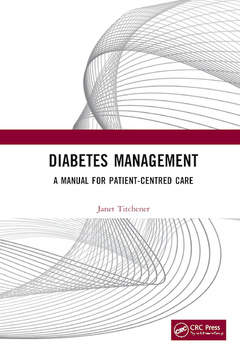Diabetes Management A Manual for Patient-Centred Care
Auteur : Titchener Janet

Diabetes is a chronic disease involving self-management by the patients. This book teaches providers the skills to translate and transfer complex medical information to empower patients to participate in making well-informed decisions about their own care on a daily basis, as directed by the American Diabetes Association. It provides the basic knowledge around the pathophysiology of diabetes, different management options including insulin management and calculations, information on how foods affect blood sugars and how to address cardiovascular risk factors. This book aims to change clinical outcomes through its unique presentation of information and its approach to awareness.
Key Features
- Follows a unique approach in imparting techniques that bring long-term patient behaviour changes, making the provision of chronic disease management more efficient and satisfying
- Serves to help professionals in their day-to-day patient management to achieve better outcomes
- Addresses the area of need for primary care and helps to make well-informed decisions by understanding the essential cost of care
INTRODUCTION
1. THE PHYSIOLOGY OF GLUCOSE METABOLISM
There are two sources of glucose
There are two 'kinds' of insulin - basal and bolus
Other hormones assist with glucose homeostasis
The kidneys also play a crucial role
2. THE PATHOPHYSIOLOGY OF DIABETES
Type 1 diabetes
Type 2 diabetes
Monogenic diabetes
Gestational diabetes
Other types of diabetes
3. MAKING THE DIAGNOSIS OF DIABETES
Criteria for the diagnosis of diabetes
Screening: testing for diabetes in asymptomatic patients
Management following a positive test
4. ORAL MEDICATIONS
5. INSULINS AND INSULIN MANAGEMENT
Insulin pharmacokinetics
Insulin delivery
Insulin dose calculations
Essential teaching points
6. SURGICAL MANAGEMENT OF DIABETES
Metabolic/bariatric surgery
Transplantation
7. CONSIDERATIONS WHEN APPROACHING DIABETES MANAGEMENT
Consider the patient as a whole
Consider underlying pathology when selecting management options
Consider the durability of management
Determining the patient’s type of diabetes and underlying pathologies
8. GLYCAEMIC MANAGEMENT Medical management of glycaemia
Individualisation of HbA1c target
Self-monitoring of blood sugars
Blood glucose management
Remission of diabetes
9. LIFESTYLE MANAGEMENT
Exercise
Foods
10. CARDIOVASCULAR RISK MANAGEMENT
Diabetes
Blood pressure
Cholesterol
Smoking
Weight
Renal protection
Aspirin use
11. PROVIDING PATIENT-CENTRED CARE
Establish a working relationship
Find a common language
Understand the patient
Acknowledge the patient as the expert
Find common ground
Empower the patient
12. EMPOWERING THE PATIENT FOR LIFELONG SELF-MANAGEMENT
Provide opportunity for ongoing education
Ensure supports and safety nets are in place - for both patient and provider
Hand over the controls
PATIENT HANDOUTS
Janet Titchener, MD, is the Medical Director of GPSI Diabetes Ltd, New Zealand, and provides care for all types of diabetes, across all age groups. Her clinical practice adheres to the principles of patient-centred clinical medicine so that each patient is considered the expert with regard to knowing which management approach will best fit with their life and life’s choices.
Date de parution : 04-2020
17.8x25.4 cm
Date de parution : 04-2020
17.8x25.4 cm
Thèmes de Diabetes Management :
Mots-clés :
Progressive Disease; diabetes management; Young Man; transfer complex medical information; Cardiovascular Risk Parameter; American diabetes association; Biliopancreatic Diversion; insulin management; Common Language; patient-centred care; HbA 1c; Sleeve Gastrectomy; Basal Insulin Dose; Moderate Dose Statins; Blood Sugar Checks; Monogenic Diabetes; Basal Insulin; Blood Sugars; Patient Provider Interaction; Insulin Doses; Pancreatic Insufficiency; Cardiovascular Risk Management; Advance Trial; Bolus Insulin; Proximal Renal Tubules; Gastric Banding; Activate GLP-1 Receptor; High Cardiovascular Risk Scores; Bariatric Surgery; Analogue Basal Insulin



